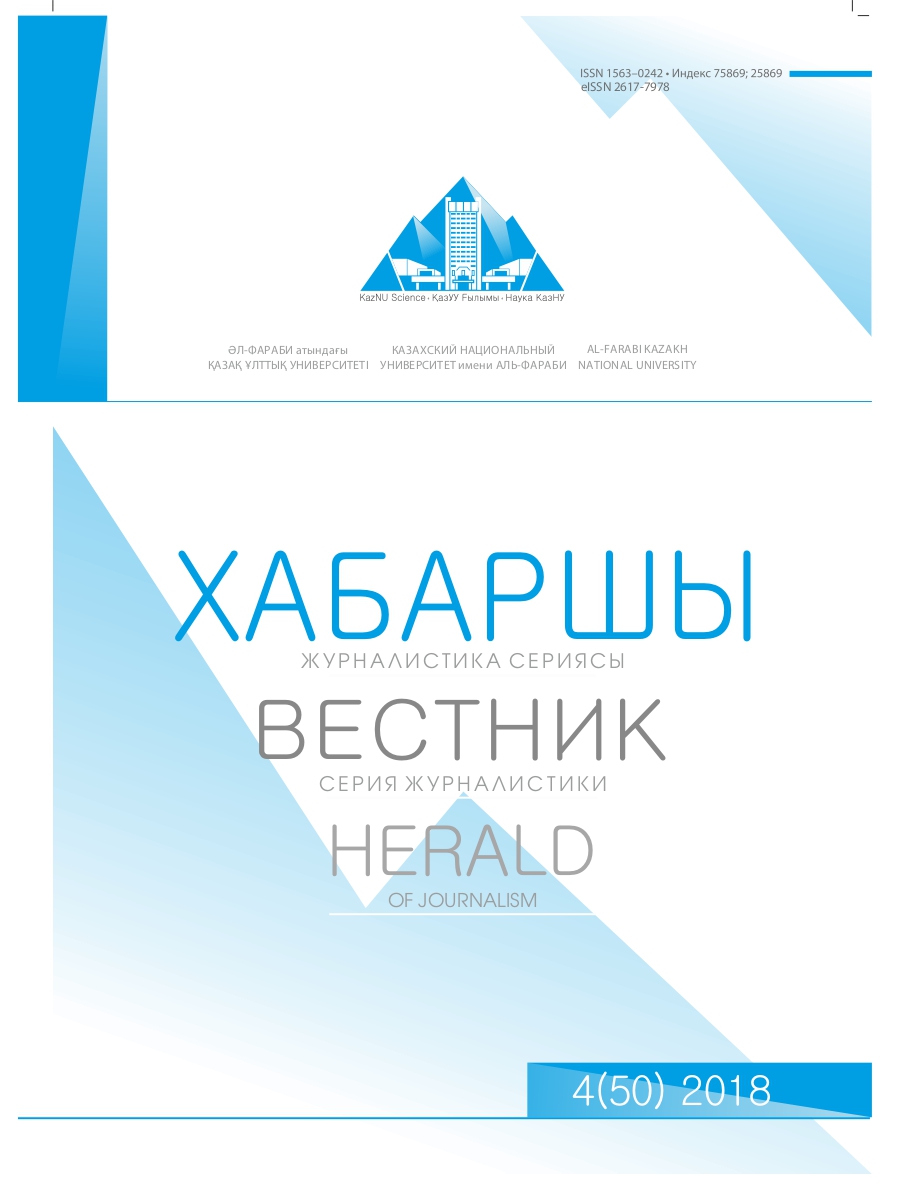Social media’s impact on political campaigns
Кілттік сөздер:
social media, new media, the internet, political campaigns, elections, politics, communication.Аннотация
Media has always been considered as the main instrument of communication between government and population. However this communication used to be unilateral and aimed to inform people before the Internet. The Internet and social media in particular created opportunities for bilateral communication of government and population. Thus, users can not only openly discuss one or other political topic
but also influence on outcomes of political campaigns. The main goal of the article is to define how internet users can influence on outcomes of elections through social media and how politicians use social media to pursue their own political goals. Scientific significance of this article is in the compliment it makes to existing concepts of social networks and new media. As a result of conducted study it has become clear that social media is a strong instrument of communication of government and population using which authorities can communicate with target groups immediately and agitate or antagonize. Using comments, blogs, messages and creation of online-communities social media users can respond to actions of politicians, agitate or antagonize. And since these conclusions were made on the basis of study of foreign experience of using social
media as a tool of influence on the outcomes of political campaigns, this work is very important from the viewpoint of international journalism. Practical relevance: Social networks and new media are considered as platforms using which anyone can feel themselves journalist and highlight political themes without even having appropriate education. That means that any concerned citizen can influence on the outcome of one or other political campaign, and doing so increase index of democracy and freedom of speech.
Библиографиялық сілтемелер
Science, 49 (2), 213-234.
Baumgartner J.C., Morris J. (2010) MyFaceTube Politics: Social Networking Websites and Political Engagement of Young
People. Social Science Computer Review 28 (1), 24-44.
Bimber B., Davis R. (2003) Campaigning Online: The Internet in U. S. Elections. New York: Oxford University Press.
Bivings Group (2009) The Internet’s Role in Political Campaigns. Research Report. Washington, D.C.: The Bivings Group.
Blumler J.G. (1979) The Role of Theory in Uses and Gratifications Studies. Communication Research. 8 (1), 9-36.
Boulianne S. (2009) Does Internet Use Affect Engagement?: A Meta-Analysis of Research. Political Communication 26 (2),
193-211.
Burgess J., Green J. (2009) YouTube: Online Video and Participatory Culture. Malden, MA: Polity Press.
Cornfield M. (2004) Politics Moves Online: Campaigning and the Internet. New York: The Century Foundation.
Davis R. (1999) The Web of Politics. New York: Oxford University Press.
Davis R., Owen D. (2001) New Media and American Politics. New York: Oxford University Press.
Drew D., Weaver D. (2006) “Voter Learning in the 2004 Presidential Election: Did the Media Matter? Journalism and Mass
Communication Quarterly, 68 (1), 27-37.
Druckman J.N., Hennessy C.L., Kifer M.J., Parkin M. (2010) Issue Engagement on Congressional Candidate Web Sites, 2002-
2006. Social Science Computer Review 28 (1), 3-23.
Gueorguieva V. (2008) Voters, MySpace, and YouTube: The Impact of Alternative Communication Channels on the 2006 Election
Cycle and Beyond. Social Science Computer Review 26 (3), 288-300.
Gulati G.J., Williams C. (2010). Congressional Candidates. Use of You Tube in 2008: Its Frequency and Rationale: Journal of
Information Technology and Politics (2), 93-109.
Howard P.N. (2005) Deep Democracy, Thin Citizenship: The Impact of Digital Media in Political Campaign Strategy. The Annals
of the American Academy of Political and Social Science 597, 153-170.
Jamieson K.H., Capella J. N. (2008). Echo Chamber. New York: Oxford University Press.
Jenkins H. (2006) Convergence Culture: Where Old and New Media Collide. New York: New York University Press.
Johnson T.J., Kaye B.K., 2008. “In Blog We Trust? Deciphering Credibility of Components of the Internet Among Politically
Interested Internet Users,” Computers in Human Behavior 25 (1), 175-182.
Johnson T.J., Mahmoud A. M. Sothirajah B., Sothirajah J. (1999). Doing the Traditional Media Sidestep: Comparing the Effects
of the Internet and Other Nontraditional Media With Traditional Media in the 1996 Presidential Campaign. Journalism & Mass
Communication Quarterly 76 (1), 99-123.
Kenski K., Stroud N.J. (2006) Connections Between Internet Use and Political Efficacy, Knowledge, and Participation Journal
of Broadcasting and Electronic Media, 50 (2), 173-192.
LaRose R., Eastin M.S. (2014) A Social Cognitive Theory of Internet Uses and Gratifications: Toward a New Model of Media
Attendance. Journal of Broadcasting & Electronic Media, 48 (3), 358-377.
Lepore J. (2012) The Whites of Their Eyes. Princeton, NJ: Princeton University Press.
Lupia A., Philot T.S. (2005) Views from Inside the Net: How Websites Affect Young Adults’ Political Interest. Journal of Politics
67 (4), 1122-1142.
Mutz D.C., Martin P.S. (2001). Facilitating Communication Across Lines of Political Difference: The Role of Mass Media.
American Political Science Review 95 (1), 97-114.
Owen D. (2002) Media Messages in American Presidential Elections. Westport, CT: Greenwood Press.
Owen D. (2009) Election Media and Youth Political Engagement. Journal of Social Science Education 38 (2), 14-25.
Sunstein C.R. (2000) Republic.Com. Princeton, NY: Princeton University Press.
Tolbert C.J., Macneal R.S. (2013) Unraveling the Effects of the Internet on Political Participation. Political Research Quarterly
56 (2), 175-185.
Wang S.I. (2007) Political Use of the Internet, Political Attitudes, and Political Participation. Asian Journal of Communication
17 (4), 381-395.
Weaver D., Drew D. (2001) Voter Learning and Interest in the 2000 Presidential Election: Did the Media Matter? Journalism &
Mass Communication Quarterly 78 (4), 41-65.
Wei R., Lo V. (2008) News Media Use and Knowledge About the 2006 U.S. Midterm Elections: Why Exposure Matters in Voter
Learning. International Journal of Public Opinion Research 20 (3), 347-362.
Zhang W., Johnson T.J., Seltzer T., Bichard.S.L. (2010) The Revolution Will Be Networked: The Influence of Social Network
Sites on Political Attitudes and Behavior. Social Science Computer Review 28 (1), 75-92.
Electronic Resources:
Statista.com. Number of monthly active Facebook users worldwide as of 3rd quarter 2018 (in millions). Access mode: https://
www.statista.com/statistics/264810/number-of-monthly-active-facebook-users-worldwide/













